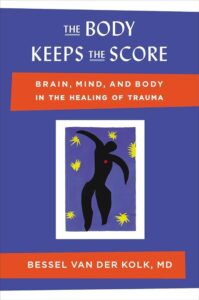🎙️ The Books Insider Recap – The Body Keeps the Score by Bessel van der Kolk, M.D.
“Trauma is not just an event. It’s a living thing that embeds itself in the body.”
Hey insiders,
This week’s episode wasn’t just a discussion — it was a quiet unfolding.
We explored The Body Keeps the Score, a book that has become something of a lighthouse for people navigating the long, complex, often invisible path of trauma.
It’s not easy to read. And it wasn’t always easy to record this episode. But it was important.
Because whether you’ve been through trauma or love someone who has… this book gives language to the things we’ve carried for too long in silence.
🧠 Trauma Lives in the Body, Not Just the Mind
We opened the episode talking about Dr. van der Kolk’s central idea: trauma isn’t just something that happens in your past — it’s something your nervous system keeps reacting to long after the danger is gone.
You flinch, freeze, go numb. You forget, but your body remembers.
The way he writes about brain scans, flashbacks, cortisol, and dissociation? It’s science, yes. But it feels deeply human. He’s not lecturing — he’s witnessing.
Listeners told us:
“I felt like I was finally hearing someone explain me to myself.”
And that set the tone for everything that followed.
💬 What We Explored in the Episode
Why trauma can make you feel detached from your own body
How PTSD isn’t just for soldiers — it shows up in abuse survivors, neglected children, people who’ve lived with chronic fear or shame
The long-term impact of childhood trauma
And how traditional “talk therapy” isn’t always enough
We also highlighted something powerful:
This book doesn’t just diagnose. It offers hope.
Dr. van der Kolk doesn’t say you’re broken. He says your brain adapted. Your body tried to protect you. And with the right tools, you can slowly come back to yourself.
🔄 Healing Isn’t Linear — and That’s Okay
We talked about the various treatment paths he explores: EMDR, yoga, neurofeedback, bodywork, theater. Some conventional, some not.
What matters most is that healing is individual, slow, and possible.
And we got real about how hard it is to sit with these truths. Sometimes you hear a story in the book that sounds like yours… and you have to pause. Breathe. Walk away. Come back later.
We said this in the episode, and I’ll say it here again:
“You don’t have to heal fast. You just have to know it’s possible.”
Final Thoughts from the Pod
The Body Keeps the Score is not a “feel-good” book — but it is a feel-seen book. And sometimes, that’s more powerful.
If you’ve ever asked, Why am I like this? or Why can’t I just move on? — this book is a place to begin.
You’re not alone. Your body was trying to protect you.
And now, slowly, it can learn to feel safe again.
Until next time,
Be gentle with yourself, and with the stories your body still holds.

